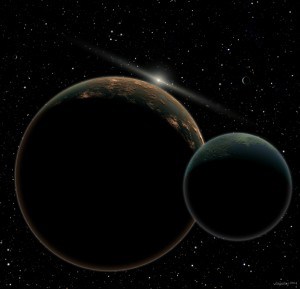
 What is a planet? For generations of kids the answer was easy. A big ball of rock or gas that orbited our Sun, and there were nine of them in our solar system. But then astronomers started finding more Pluto-sized objects orbiting beyond Neptune. Then they found Jupiter-sized objects circling distant stars, first by the handful and then by the hundreds. Suddenly the answer wasn’t so easy. Were all these newfound things planets?
What is a planet? For generations of kids the answer was easy. A big ball of rock or gas that orbited our Sun, and there were nine of them in our solar system. But then astronomers started finding more Pluto-sized objects orbiting beyond Neptune. Then they found Jupiter-sized objects circling distant stars, first by the handful and then by the hundreds. Suddenly the answer wasn’t so easy. Were all these newfound things planets?
Since the International Astronomical Union (IAU) is in charge of naming these newly discovered worlds, they tackled the question at their 2006 meeting. They tried to come up with a definition of a planet that everyone could agree on. But the astronomers couldn’t agree. In the end, they voted and picked a definition that they thought would work.
The current, official definition says that a planet is a celestial body that:
1. is in orbit around the Sun,
2. is round or nearly round, and
3. has “cleared the neighborhood” around its orbit.
But this definition baffled the public and classrooms around the country. For one thing, it only applied to planets in our solar system. What about all those exoplanets orbiting other stars? Are they planets? And Pluto was booted from the planet club and called a dwarf planet. Is a dwarf planet a small planet? Not according to the IAU. Even though a dwarf fruit tree is still a small fruit tree, and a dwarf hamster is still a small hamster.
Eight years later, the Harvard-Smithsonian Center for Astrophysics (CfA) decided to revisit the question of “what is a planet?” On September 18th, CfA hosted a debate among three leading experts in planetary science, each of whom presented their case as to what a planet is or isn’t. The goal: to find a definition that the eager public audience could agree on!
Science historian Dr. Owen Gingerich, who chaired the IAU planet definition committee, presented the historical viewpoint. Dr. Gareth Williams, associate director of the Minor Planet Center, presented the IAU’s viewpoint. And Dr. Dimitar Sasselov, director of the Harvard Origins of Life Initiative, presented the exoplanet scientist’s viewpoint.
Gingerich argued that “a planet is a culturally defined word that changes over time,” and that Pluto is a planet. Williams defended the IAU definition, which declares that Pluto is not a planet. And Sasselov defined a planet as “the smallest spherical lump of matter that formed around stars or stellar remnants,” which means Pluto is a planet.
After these experts made their best case, the audience got to vote on what a planet is or isn’t and whether Pluto is in or out. The results are in, with no hanging chads in sight.
According to the audience, Sasselov’s definition won the day, and Pluto IS a planet.
The video of the debate and audience vote can be seen on YouTube at www.youtube.com/user/ObsNights
*******
For me personally, Pluto has always been a planet and always will be. Ed Krupp, director of Griffith Observatory in Los Angeles, agrees, and shows nine planets (including Pluto) in Griffith’s displays. Neil deGrasse Tyson, director of Hayden Planetarium in New York, disagrees, and has left Pluto out of Hayden’s displays. And the legislature of New Mexico, where Pluto discoverer Clyde Tombaugh spent his later years, has passed an official declaration that Pluto will always be called a planet in that State.
So the controversy rages on. School children seem to have especially strong feelings about little Pluto, as the following poem—the Young Adult 3rd-place winner in Astronomers Without Borders’ 2014 AstroPoetry Contest—shows:
PLUTO
By Rachel Pribble, Broken Arrow, Oklahoma
Pluto
Forgotten Planet
Isolated, neglected, frigid
Small but worthy rock
Planetoid


re: “And the legislature of New Mexico, where Pluto discoverer Clyde Tombaugh spent his later years, has passed an official declaration that Pluto will always be called a planet in that State.”
If you can believe WikiPedia, Clyde Tombaugh is the great uncle of Dodger Pitcher Clayton Kershaw.